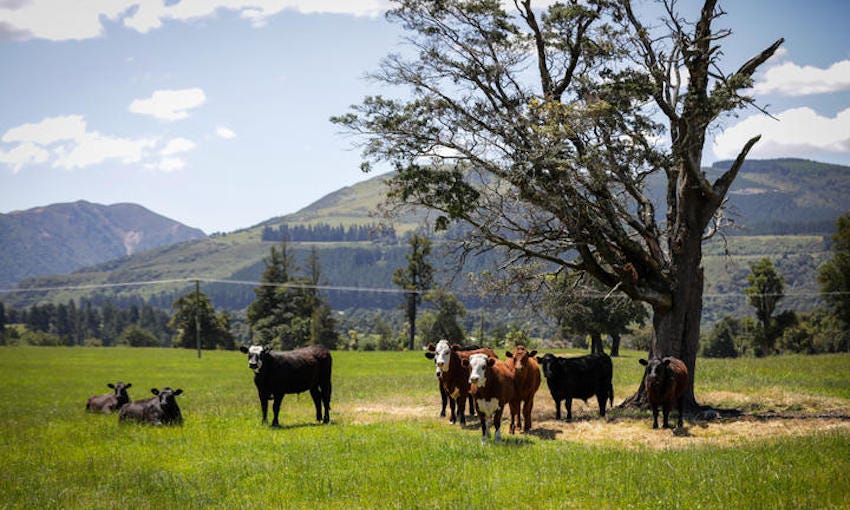Trees worth more than cows as carbon price soars
New Zealand's carbon market is acting odd and some worry it could push the conversion of more farms into pine forests
Mōrena and welcome to The Bulletin for Thursday, September 16, by Justin Giovannetti. Presented in partnership with Z Energy.
In today’s edition: MIQ bookings are reopening next week, your suggestions for the jab cab and the government delays its climate plan, but first, trees.
Five farms were approved for sale in July to become commercial forests (RNZ/Nate McKinnon)
New Zealand’s carbon price is at a record high, which means planting pine trees will now fetch farmers more money than raising sheep and beef. That’s according to an analysis from Interest warning that the country’s farmers, as well as its timber industry, now face pressure from a surging carbon price. The result could be that productive land now used for livestock and lumber is turned over to forest plantations that suck up carbon emissions. Dairying, as well as growing fruits and vegetables, is still more profitable than trees. Carbon farming, as it’s sometimes known, isn’t a new idea, but the economics have shifted remarkably in recent years.
The interest in tree planting is growing on the ground. BusinessDesk reports that a carbon farming investment fund is looking to spend $15 million to buy 1,500 hectares of land where they could plant pine trees. The group estimates they can create a New Zealand unit, which is the term for one tonne worth of emissions, for between $20 and $25. Those units were recently selling for about $65 on the emissions trading scheme, doubling in less than a year. The business proposal for carbon farms is simple: You make money selling the emissions credits and do some forestry work on the side to keep the cash rolling in.
Time out: A quick explainer on the emissions trading scheme. Many companies need to own a credit, bought on the ETS, for every tonne of emissions they create in a year. Called a cap-and-trade scheme in other countries, the ETS is a market where those credits are bought and traded. There's a cap on the number of credits that can exist, which means New Zealand's overall emissions can't go higher than a certain level and the price of credits fluctuates based on demand.
A number of farm sales have happened in recent months for tree conversions. A 20 square kilometre sheep and beef farm in the South Island was sold to an Austrian company that intends to cover most of it with pine forest, the Otago Daily Times reports. Four more farms were sold in July for conversion to forest. Local leaders have called on the government to bring more scrutiny to the sales, as it’s a pretty significant land-use change that could be indefinite as pine trees need decades to grow to maturity. According to The Gisborne Herald, Māori landowners have shown a preference for a move towards native trees.
The entire idea is not without critics. Some farm groups have been unhappy with a programme that transforms agricultural land into forests and the Climate Change Commission itself isn’t keen on the idea, as I reported in The Spinoff earlier this year. In advice to government, the commission said that there should be more of a focus on planting native trees, which take centuries to grow, and only in areas that aren’t suitable for agriculture. However it concluded that large-scale tree planting won’t help us meet climate targets long term, so we shouldn’t invest too much in it.
The country’s main mechanism for combating climate change (for now) is the emissions trading scheme and it has been acting a little odd in recent weeks. For starters, the price of carbon credits has soared. As Newsroom reports, an auction earlier this month saw the price that polluters needed to pay to buy a credit for a tonne of emissions break through an artificial ceiling set by the government. As a result of going above $50, the government tried to flood the market with new credits to keep prices down. It didn’t quite work and prices are above $60. The country will also need to figure out a way to reduce emissions in the future by 1.6 million tonnes, because those new credits need to come from somewhere.
New Zealand will face a push later this year to reduce its emissions. The United States and the European Union are preparing to reduce methane emissions by at least 30% by 2030, according to Newshub. The two will attempt to convince a number of countries to join a pact, including New Zealand. Methane is a powerful greenhouse gas, with up to 34 times more warming potential than carbon dioxide. The gas is also a byproduct of cows and is one of the main reasons New Zealand’s emissions have increased in recent years, with agriculture now accounting for nearly half. Planting trees might reduce the country’s overall emissions in the short-term, but it won’t help when faced with a methane pact from the rest of the world.
If you like what you’re reading, we need your support. The Spinoff is doing our utmost to keep you updated on Covid-19 related news. Every dollar our members contribute directly funds our editorial team and is devoted to ensuring we do more. Click here to learn how you can support the team today.
Bookings for managed isolation will open again next week with tweaks. Thousands of rooms will be available on Monday morning, a month after bookings were paused. Stuff reports that things will be different this time, with people interested in a MIQ spot being asked to join a lobby and then being randomly selected to enter the system to book. Not everyone will get a room but the lobby is expected to get rid of the bots and automated scripts that were snapping up rooms in a split second and then selling them off for thousands of dollars.
According to RNZ, it's not all good news. No rooms will be made available for people stuck in Australia, including superannuitants who are having their pension payments suspended because they can't get home.
The Covid numbers: 14 new community cases were reported yesterday and 19% (3) of the previous day’s cases were active in the community while infectious. All the cases were in Auckland. 983 cases have now been detected in the delta outbreak and 456 have recovered. 62,155 people were vaccinated yesterday.
Readers have spoken. A flood of you sent in suggested names for the country’s Covid-19 vaccination bus and it was a pretty impressive effort. Here are 10 from a list that was quite hard to narrow down:
Jab cab
Grab a jab
Vaxi taxi
Jabberwocky
Prick up truck
Bubble buster
Abracajabya
Doctor Bloomfield's Pfizer vaccine van
The shot bus
Jabba-jabba-do!
The prime minister could announce a name this afternoon. Covid-19 minister Chris Hipkins has said he’s a fan of Jabberwocky.
When you can’t meet the deadline, change the rules. The government announced late yesterday that it is going to change the climate change law to give itself another five months to come up with a plan to tackle emissions, Interest reports. The law currently requires the government to produce a plan before the end of the year. However, climate change minister James Shaw blamed Covid-19 in a statement and said consultation on a future plan will start next month. The head of the climate change commission handed in final advice for a plan to Shaw in June and warned then that the government needed to get on with it.
A new poll has National falling within six percentage points of Act. Stuff reports that the poll from Curia, National's historic pollster, shows it at 21.4% while Act is at 14.9%. The poll was commissioned by the right-wing Taxpayers' Union. A second poll, from Labour pollster UMR was also leaked yesterday and showed National at 26%. NZ Herald political editor Claire Trevett has written that the two polls could signal the end of Judith Collins' leadership, with Act and leader David Seymour both surging.
Collins lashed out at her former senior press secretary after yesterday’s extraordinary interview in The Spinoff. Speaking with Stuff, Collins said that the criticism was unprofessional and dismissed Janet Wilson, a long-time party insider and Collins’s own conduit to the media through an election campaign, as former leader “Todd Muller’s secretary”.
Got some feedback about The Bulletin, or anything in the news?
Get in touch with me at thebulletin@thespinoff.co.nz
Right now on The Spinoff: Siouxsie Wiles & Toby Morris write that the young still need to be vaccinated, even if they are fit and healthy. Jesse Mulligan bids farewells to Norm Macdonald, his comedy hero who died yesterday after a secret battle with cancer (that moth joke is hilarious). Tim Dare & Justine Kingsbury worry that a domestic vaccine passport could cause inequality and discrimination. Anna Rawhiti-Connell looks to the 1990s for comfort in week five of lockdown. An open letter to the government calling for it to be kind to the people of Afghanistan.
For a feature today, Derek Cheng writes about falling off a mountain. A few days before lockdown I ran into Derek at a climbing gym in Petone. The deputy political editor for the NZ Herald was scurrying up the toughest climbing wall in the place with absolute ease. Half the gym stopped and watched as he climbed up to the rafters, hung upside down, held on with one arm and then proceeded to run his climbing rope through his teeth. For fun. He was showboating, this was easy.
He’s done much harder climbing. Cheng spoke to The Fold a few months ago about his climbing. He’s now written for Outside about what happened when he fell in Sierra Nevada. Be warned, it’s a gnarly read in spots with a few moments of levity. Here’s a taste:
The nurse’s notes, which I later read, show that I told staff that I didn’t think I had any broken bones, nor did I consider myself in severe pain. They must have thought me mad, or at least completely incapable of self-diagnosis.
“Patient covered in blood,” the hospital report states. “Essentially covered head to toe in contusions, abrasions, and lacerations … multiple internal injuries including 1-2cm head bleed … multiple facial fractures … possibly unstable.”
A decision on the America's Cup could come tomorrow and a businessman is making a last-minute pitch to keep it here. Stuff reports that Mark Dunphy, the chief executive of Greymouth Petroleum, is trying to keep the cup in Auckland but is running into a wall of suspicion from other business executives. He says it's really a question of whether Team NZ wants to mount a defence here and time is running out. Stuff also reported that the Spanish government is still working to win the race for Valencia.
That's it for The Bulletin. If you want to support the work we do at The Spinoff, please check out our membership programme.







